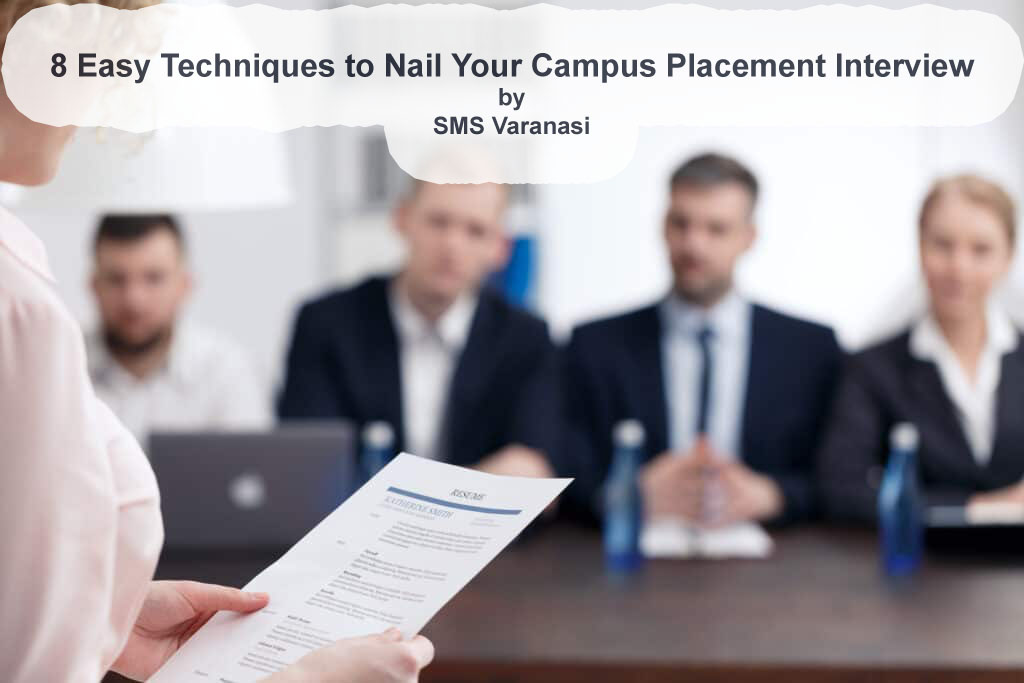Introduction: Campus placement interviews can be a gateway to your professional life, especially in esteemed institutions like SMS Varanasi. Being well-prepared can significantly increase your chances of success. Whether you’re aiming for a role in a multinational corporation or a dynamic startup, mastering certain techniques can help you make a positive impression and navigate through the interview process with confidence. This blog post will guide you through eight easy techniques specifically tailored for students facing campus placement interviews at SMS Varanasi, helping you to not only meet but exceed the expectations of your potential employers.
The season of SMS Varanasi placements is upon us, and the air is buzzing with anticipation. All the final-year college students and fresh graduates will be vying for their dream companies and dream positions. For many, this will be a life-changing experience.
To help you clear the main hurdle – the campus placement interview – and land the job you like, here are some of the most effective job interview tips to stand out and impress potential employers:
1. Know Yourself, Know Your Company

This is the time for college students to dive deep into their strengths, weaknesses, and career aspirations to have a clear idea of how they are going to present themselves in campus placement interviews.
For example, an MBA topper might want to highlight his academic achievements and relevant skills during a job interview, while remaining humble and open to learning. On the other hand, a graduate with a low CGPA but diverse co-curricular experience may want to talk about their transferable skills acquired through leadership roles and active participation in different activities. They may also highlight their ability to learn and adapt quickly.
Also, they should research the company they are targeting thoroughly – and understand their values, mission, and recent projects. It will help them tailor their responses to the specific needs of the company. It also demonstrates that they have a genuine interest in the position and have done thorough preparation for it.
2. Prepare Your ‘Elevator Pitch’

Do not be afraid of a campus placement interview. Remember all candidates here are college students and you have a strong chance of landing a job if you play it right.
Successful recent alumni are sharing some interview techniques on how to craft an elevator pitch that helped them crack SMS Varanasi placements and make a great first impression:
- Start with a Hook: A hook is an attention-grabbing statement or achievement. For example:
“Recently, in my final year project, I developed a __________ that helped ________. I believe my experience with work with _____ aligns perfectly with your company’s focus on _________.”
Or
“While pursuing my major in ______, I participated in an industry event/workshop/conference related to ________ because of my deep interest in __________________. I’m eager to use my passion for _________ to contribute to your team’s success.”
- Highlight Key Skills: In your elevator pitch, try to mention at least 2-3 skills (a mix of hard and soft skills) that align with the job description. For example:
“My academic background in ______ equipped me with ________ and ________. I also have experience in ________ where I ____________.”
Some of the skills college students can highlight in a college placement interview are:
Technical Skills:
- Proficiency in relevant software or programming languages (e.g., Python, Java, R)
- Expertise in specific technical areas (e.g., data analysis, web development, network security)
- Ability to use design software like Photoshop or Illustrator
- Knowledge of industry-specific tools and technologies
Soft Skills:
- Excellent communication skills (written and verbal)
- Strong teamwork and collaboration skills
- Problem-solving skills and ability to think critically
- Ability to work independently and take initiative
- Time management and organizational skills
- Leadership skills and ability to motivate others
- Adaptability and willingness to learn
Other Skills:
- Experience with research projects or presentations
- Participation in extracurricular activities or leadership roles
- Foreign language proficiency
- Volunteer experience
- Show Passion & Potential: You can mention a line connecting your passion with the company’s focus. For example:
“I’m particularly drawn to _______ because it aligns with my interest in ______. I’m a quick learner and eager to contribute with my fresh perspective and willingness to grow.”
You can also mention any relevant volunteering, internship, or summer jobs you have done to demonstrate you are really interested towards the field.
- End with a Call to Action: Always end your pitch with an invitation to interact with you further. For example:
“I’d love to learn more about the opportunities at ______ and how my skills could benefit your team.”
Even if you do not get a job offer instantly, do ask for their email address and follow-up. Persistence pays off and recruiters might consider you just for that reason.
In the end, always remember, that an elevator pitch should be concise – ideally under 30 seconds. Also, why you will have a few common sentences to introduce yourself, tailor your elevator pitch for each company. Highlight the skills relevant to the company and the position they are hiring for.
As all job interview tips say, practice your elevator pitch in front of the mirror or with friends – until you feel confident and enthusiastic enough.
Pay attention to your tone, body language, and posture while introducing yourself. Your aim should be to sound confident but humble. Arrogance or rudeness can ruin your chances of getting the job you like.
3. Be an Active Listener

One of the top job interview tips is to pay close attention to the interviewer’s questions and respond thoughtfully. Don’t interrupt or ramble off irrelevant details.
Ask clarifying questions if needed, showing your genuine interest and ability to think critically.
Here are some tips to improve your active listening during your next campus placement interview:
Before the interview:
- Research the company and job role: This helps you understand the context of the interview and anticipate potential questions.
- Prepare key points and stories: Having examples ready helps you answer questions thoughtfully and showcases your skills.
During the interview:
- Minimize distractions: Silence your phone and avoid fidgeting. Focus solely on the interviewer.
- Listen carefully and avoid interrupting: Give the interviewer time to finish their questions before responding. Many times, students make the mistake of jumping to conclusions. You need to focus objectively on what the interviewer is saying and respond accordingly.
- Verbally acknowledge what you hear: Use phrases like “Okay,” “I see,” and “That’s interesting,” to show you’re following along.
- Clarify and paraphrase: If unsure about a question, politely ask for clarification. Restate questions in your own words to confirm understanding.
- Focus on both verbal and nonverbal cues: Pay attention to the interviewer’s tone, facial expressions, and gestures for deeper understanding.
After the interview:
- Make notes and review them: Reflect on the interview, make notes, and identify areas where you excelled in active listening and where you could do better.
- Practice makes perfect: Role-play with friends or family to improve your listening skills.
4. Showcase Your STAR Power

Use the STAR method (Situation, Task, Action, Result) to answer behavioural questions. For example:
“Tell me about a time you faced a difficult problem at work or in your studies. How did you approach it and what was the outcome?”
Or
“Describe a situation where you had to make a tough decision under pressure. What did you consider and what did you choose to do?”
While answering such questions, describe a relevant challenge you faced, the actions you took, and the positive results achieved. Quantify your achievements whenever possible to showcase your impact. For example, while answering the first question, you could say:
- Situation: “During my marketing internship, we were tasked with increasing website traffic for a new product launch. However, initial efforts fell short of our targets.”
- Task: “As the content creator, I was responsible for analyzing website traffic data and developing engaging content to attract visitors.”
- Action: “I collaborated with the web analytics team to identify key user demographics and content gaps. Then, I created diverse content formats (blog posts, infographics, videos) targeting specific user interests and optimized SEO performance.”
- Result: “Within three months, website traffic increased by 30%, exceeding our target. My content received positive feedback for its engaging style and informational value, contributing to higher product awareness and purchase intent.”
5. Highlight Your Uniqueness
The first step to mastering interview techniques is to know yourself. Reflect on what sets you apart from other candidates.
Most job interview tips tell you to share relevant awards, achievements, or projects that demonstrate your initiative, leadership, or passion for the field. But the core idea is to showcase your unique skills and personality!
One of our recent graduates, Anika (fake name) was an average student with no internship or summer job experience. She nailed it by saying:
“While I am still a fresher, I enjoy working with people. Here’s the project I did in the final year of my MBA where I analyzed how AI and automation are changing the HR landscape and have given my recommendations for future workforce planning, talent acquisition, and training strategies.
My analytical mind and relentless drive are going to be my keys to contributing to your company’s success. Challenges? I see them as opportunities to learn and grow. As a leader, I inspire and empower others, just like I did while leading the TedX event held on our campus last month.
I’m a quick learner, fiercely determined, and deeply passionate about making a difference.”
6. Dress for Success

If we haven’t said it yet, first impressions go beyond words.
Dress professionally and appropriately for the company culture. Remember, confidence starts from within, but feeling comfortable and polished in your attire can definitely boost it.
Some tips on how you should dress up for SMS Varanasi placements are:
- Wear modest clothing. Ideally, wear something that covers your shoulders, chest, and legs. Avoid wearing revealing or tight-fitting clothes.
- For a campus placement interview, wear formal clothes that are acceptable for business or any other formal event. This could include a formal shirt, pants/skirt, or a suit.
- Girls are often seen in traditional Indian attire in SMS Varanasi placements and it’s acceptable. A salwar-kameez or Kurti-leggings are advised. The dupatta of the kameez must not have any bells or flashy hangings.
- A few accessories, such as watches and belts can help you make a great first impression.
- Placement experts advise students not to have fancy hairstyles. For boys, facial hair is also not advised. But if you do sport a beard and a moustache, keep them neatly trimmed.
- In a job interview setting, wear formal shoes. Well-polished shoes are preferable.
Wear clean, well-ironed clothes. The aim here is to project a professional image.
7. Practice Makes Perfect
Rehearse common interview questions with friends, family, or career advisors. You may also want to simulate the interview environment to practice your responses and manage your nerves.
The more prepared you feel, the calmer and more confident you’ll be on the day.
8. Follow Up is the Key
Always send a thank-you email to the interviewer within 24 hours. Reiterate your interest in the position and highlight key points from your discussion.
This shows professionalism on your time and appreciation for their time. Plus, they also serve to remind them of you (among the hundreds they may have interviews that day).
SMS Varanasi placements for this academic year are just around the corner. These campus placement interviews are your chance to shine. By implementing these easy interview techniques, you can showcase your skills, demonstrate your passion, and leave a lasting impression on potential employers.
So, relax, breathe, and go out there and nail it!





